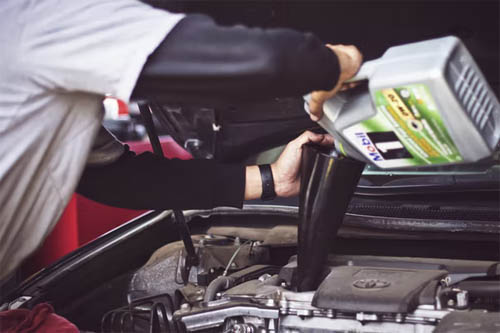The Renault Trafic is a light commercial vehicle and is placed below the Renault Master. The car manufacturer launched the panel van for the first time in 1980. The transporter turned out to be a long-distance runner and lasted until 2001. The successor was also built for 13 years; in addition to the Renault version, the Trafic was also available as an Opel Vivaro and later also as a Nissan Primastar. The Opel cooperation has now ended, but the French have found a new partner in Fiat. The third Trafic, available since 2014, is also sold as the Fiat Talento. Compared to the first generation, the Trafic is now much more like a car and is also suitable as a coach in the station wagon version with seats instead of loading space.
Money Saving Fact: Changing the oil in your Renault Trafic will definitely be the cheapest way. However most people don't want the hassle of getting all oily and dirty. But you can still save money even if you use a local garage or Renault dealership. Most people don't realise that when taking your Renault Trafic for a service you can provide the oil for the oil change yourself. You can order the right type of oil cheaply on the internet or pick up at your local automotive centre (like Halfords or even some supermarkets). But make sure that you buy an Renault approved engine oil so there are no problems with your factory warranty.
The Renault Trafic is powered by a four-cylinder diesel engine with a choice of three power levels. The 1.6-litre diesel is available with 95 hp, 125 hp and 145 hp. All versions have front-wheel drive and a 6-speed manual gearbox. The normalized consumption and emission values range from 5.6 to 6.0 litres per 100 kilometers and 145 g/km to 155 g/km CO2. The middle version with a total weight of 2.7 tons is the most economical. In practice, the consumption values are around 7.0 litres.
Motor oil is a vital part of your Renault Trafic's engine. It provides the much needed lubrication to many of the internal parts of an engine. One of its key jobs is to prevent wear and tear on the moving parts which helps keep the engine running smoothly. Without oil, the engine would cease up almost immediately.
We have listed all the Renault Trafic models and engine types in the following table, as well as the correct engine oil grade for each of the cars. You can use the search and filter to easily find the right engine oil for your Renault Trafic.
| Car Make & Model | Year | Oil Grade |
|---|---|---|
| Renault 0 Combi Blue dCi 110 Start 4dr Diesel | 2020, 2021, 2022 | 5W-30 |
| Renault 0 Grand Combi Blue dCi 110 Start 4dr Diesel | 2020, 2021, 2022 | 5W-30 |
| Renault 0 Combi Blue dCi 110 Life 5dr Diesel | 2020, 2021, 2022 | 5W-30 |
| Renault 0 Combi Blue dCi 150 Start 4dr Diesel | 2020, 2021, 2022 | 5W-30 |
| Renault 0 Grand Combi Blue dCi 110 Life 5dr Diesel | 2020, 2021, 2022 | 5W-30 |
| Renault 0 Grand Combi Blue dCi 150 Start 4dr Diesel | 2020, 2021, 2022 | 5W-30 |
| Renault 0 Combi Blue dCi 150 Life 5dr Diesel | 2020, 2021, 2022 | 5W-30 |
| Renault 0 Grand Combi Blue dCi 150 Life 5dr Diesel | 2020, 2021, 2022 | 5W-30 |
| Renault 0 Combi Blue dCi 150 EDC Life 5dr Diesel | 2020, 2021, 2022 | 5W-30 |
| Renault 0 Combi Blue dCi 170 EDC Life 5dr Diesel | 2020, 2021, 2022 | 5W-30 |
| Renualt Trafic 1.6 dCi Diesel | 2014, 2015, 2016 | 5W-30 |
| Renualt Trafic 1.6 dCi Diesel | 2017, 2018, 2019 | 5W-30 |
| Renualt Trafic 1.6 dCi Diesel | 2020, 2021, 2022 | 5W-30 |
| Renualt Trafic 1.6 dCi ENERGY Diesel | 2014, 2015, 2016 | 5W-30 |
| Renualt Trafic 1.6 dCi ENERGY Diesel | 2017, 2018, 2019 | 5W-30 |
| Renualt Trafic 1.6 dCi ENERGY Diesel | 2020, 2021, 2022 | 5W-30 |
Regularly checking and changing your Renault Trafic engine oil is really important. Every time you start and run your car, very fine by-products from the combustion in the engine will be collected in the engine oil. This is one of the reasons why over time the oil goes black. If these contaminants build up too much and exceed the capacity of the oil it can have a negative impact on your car’s overall efficiency and actually effect its performance as it creates sludge and increased wear in the engine block.
Every engine oil will have its viscosity grade labelled on the packaging. This will look something like 0W-20, 5W-30 or 5W-40. This grading is used to measure how thick / fluid the oil is and help ensure you buy the right oil for your car. The lower the viscosity grade of the oil, the more fluid and thinner it will be than those with a high grade (higher numbers) which will be much less running and thick.
So which engine oil should you buy for your Renault Trafic? Whether you are topping up your Renault Trafic oil or doing a full change of your Renault Trafic's oil it is really important that you use the correct grade of oil.
